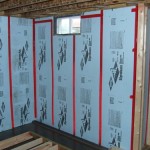Financial Considerations – Building A New House
With all of the financial and real estate turmoil going on I thought about sharing some of my insight on the issue from a builders point of view. Building a new house is certainly a very big financial commitment and one that can be quite stressful. So here are some financial considerations to keep in mind as you begin building a new house.
Building New = Paying A Premium
With today’s financial crisis and scrutiny on mortgages and lending you may find it difficult to find a bank that wants to finance building a new house. The problem starts with the dropping value of existing homes. Existing home values have dropped much faster than the cost of construction. This is not a good sign when it comes time for your appraisal.
For example: Let’s say you want to build a new 3 bedroom ranch style home with 1,800 square feet. The bank will then go out and hire an appraiser to come up with an appraisal to use with your construction loan application. The appraiser may come back with an appraisal around $250,000 or $139 per square foot.
Now let’s say your contract for the new house is for $297,000 or $165 per square foot (very reasonable price for today). In this scenario the bank is most likely only going to loan you 80% to 95% of the appraised value or potentially as little at $200,000. This ends up leaving you to come up with almost 33% as a down payment.
Ultimately this means you’re going to pay a premium right now to build new versus buying an existing home. This is not to say that it’s a bad time to build, it just means that existing homes are being sold for less than you can build a new home. At some point either existing home values will rise or material and labor costs will come down to more closely match existing home values.
Banks typically don’t really count finish upgrades very well in the appraisal. Granite countertops will not see their full value in an appraisal. The same is true for expensive flooring and trim details.
Realistic Contingencies
Having a realistic contingency in place and approved by your bank is so important. Very often we start building a new house and the owners will start signing change orders. The change orders may not be all that expensive, $500 here, $1,100 there, but eventually all of this starts to add up. At some point those change orders are submitted for payment and your bank calls a time out! They may refuse to pay them because the loan to value ratio is much too high and you’re not approved for the extra money.
It’s extremely rare for a new house to be built without some type of change order resulting in cost increases. There are numerous reasons for overruns, hitting ledge, wells that need to be drilled deeper, you decide to add 2 feet to the living room, the list can go on and on. So it’s best to set aside some money from the beginning for all these changes. I typically recommend a 5% to 10% contingency.
Realistic Budget and Mortgage
I know this sounds silly but it’s worth stating over and over again. This topic also ties into the contingency that I mentioned above. You need to set a realistic budget (including the potential for cost increases, i.e. contingency) that you can afford. Too often we see customers ask us to build a new house that pushes them to their financial limit.
I know this for several reasons. All to often we see the following situations which blow my mind. The project is nearing completion and the customer realizes that they need to purchase new appliances or they need to fill the oil or propane tank. The next thing you know they are asking if we can add that to their contract so they can add it to their mortgage! Yes, you heard me correctly, they want to add the price of a refrigerator or tank of oil to their mortgage! Can you imagine financing a refrigerator for 30 years?
So if you plan on building a new house make sure you come up with a realistic budget and stick to it. Be honest up front with your banking institution about needing a contingency for changes. By sticking to a budget you’ll be able to finish your project on budget and not have to cash in some investment at the 11th hour because you were not prepared.
Summary
If you want to build a new house today then do your homework ahead of time. Make a budget, stick to it and be realistic. Don’t go out and buy granite and mahogany floors if you can’t afford them on your own. With today’s tight mortgage market plan on having a significant down payment and equity in your new home.













Leave a comment